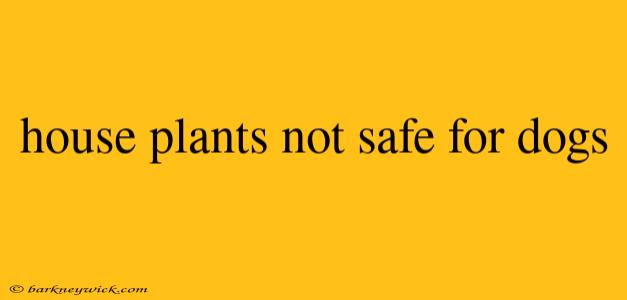Beware the Bite: Houseplants That Are Toxic to Dogs
My dog, Winston, is a notorious plant nibbler. He's got a thing for anything green and leafy. One day, he took a bite out of my beautiful peace lily – a plant I had proudly displayed on my coffee table. Thankfully, I caught him in the act, but it was a wake-up call. I realized that not all houseplants are safe for curious canines. This led me down a rabbit hole of research, uncovering a surprising number of common houseplants that are toxic to dogs.
Common Toxic Houseplants for Dogs
In my opinion, knowing which plants pose a risk is essential for any dog owner. After all, we want our furry friends to be happy and healthy, and that includes protecting them from potential hazards in our homes.
Here are some common houseplants that can be dangerous to dogs:
- Lilies (all varieties): Lilies are particularly dangerous for dogs, even a small amount can cause kidney failure. Source: ASPCA Animal Poison Control Center
- Sago Palms: This popular houseplant contains a toxin called cycasin, which can cause liver failure in dogs.
- Peace Lilies: These plants contain calcium oxalate crystals that can cause irritation, swelling, and difficulty breathing.
- Pothos: Also known as devil’s ivy, pothos can cause oral irritation, vomiting, and diarrhea in dogs.
- Philodendrons: These are another popular houseplant that can be toxic to dogs, causing similar symptoms to pothos.
It's important to note: This is not an exhaustive list. There are many other plants that can be harmful to dogs. If you're unsure about a particular plant, it's best to err on the side of caution and keep it out of reach of your dog.
What to Do If Your Dog Ingests a Toxic Plant
If you suspect your dog has ingested a toxic plant, it’s crucial to act quickly.
- Remove any remaining plant material from your dog's mouth.
- Call your veterinarian immediately.
- If possible, take a sample of the plant with you to the vet. This will help them determine the best course of treatment.
The ASPCA Animal Poison Control Center (888-426-4435) is also a valuable resource. They offer 24/7 emergency advice for pet poisonings.
Tips for Keeping Your Dog Safe Around Plants
- Identify and remove any toxic plants from your home.
- Keep plants out of reach of your dog, either by placing them on high shelves or in rooms your dog doesn't frequent.
- Train your dog to leave plants alone. Positive reinforcement and treats can be effective.
- Consider using pet-safe plants. There are many beautiful and non-toxic plants that are perfect for dog-loving households.
Final Thoughts
Winston, after his peace lily incident, learned his lesson (mostly!). Now, he only nibbles on the dog-friendly plants I've replaced them with. By learning about the potential dangers of toxic houseplants and taking preventative measures, you can help keep your furry companion safe and happy. Remember, a little knowledge can go a long way!
